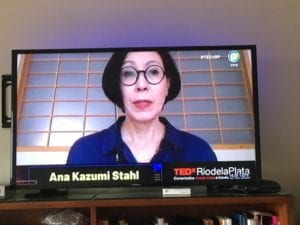 Can learning from other cultures inspire resilience in challenging times? NYU Buenos Aires Director Anna Kazumi Stahl believes so and recently gave a TEDx talk on Japanese cultural codes as appropriate inspiration for social distancing. She has now been asked by TED to participate in the main conference this year as one of the foreign language contributors. This year’s main event, on May 23, to be conducted entirely remotely, will feature Kazumi Stahl as one of its Spanish-speaking presenters.
Can learning from other cultures inspire resilience in challenging times? NYU Buenos Aires Director Anna Kazumi Stahl believes so and recently gave a TEDx talk on Japanese cultural codes as appropriate inspiration for social distancing. She has now been asked by TED to participate in the main conference this year as one of the foreign language contributors. This year’s main event, on May 23, to be conducted entirely remotely, will feature Kazumi Stahl as one of its Spanish-speaking presenters.
Kazumi Stahl’s original talk, How Collectivist Cultures React to the Pandemic, was organized by TEDxRiodelaPlata, a TEDx group in Buenos Aires that functions as a think tank which focuses on community engagement through their events. Her history with the group dates back to 2013, when she was asked to explore her own identity and her choice to write in a foreign language. A fiction writer and scholar of comparative literature, Kazumi Stahl, the daughter of a Japanese mother and a father of German descent father, is an American citizen who calls Buenos Aires home, and writes primarily in Spanish.
As Argentina began its program of isolation and social distancing in response to COVID-19, TEDxRiodelaPlata was invited by Argentine national public television to select eight speakers that could help people consider the positives of the situation.
Kazumi Stahl’s talk – which is available online with subtitles here – explores the ideas which inform collectivist cultures, and considers how to interpret certain behaviors as gestures of respect or closeness. The aim of this talk was “to consider other cultures so as a way to offer encouragement or hope for those feeling overwhelmed or afraid.”
Among the Japanese cultural codes that Kazumi Stahl considers are:
| Hedatari | Distance | “Rather than a coldness, this gesture conveys acknowledgement of the other as not to be invaded or imposed upon, as if saying, ‘I see you.’ Japanese culture doesn´t call for an immediate physical intimacy like handshaking […]; instead things begin with a conscientious giving of space, respectfully interacting, and then over time and with the right conditions closeness may arise.” |
|---|---|---|
| Wa | Harmony | “[A]cross cultures we experience ways of connecting ourselves to larger entities we are a part of, such as the bonds signalled by a Mets cap, a national team jersey at the Olympics, or even the NYU torch. In Japan this concept of ‘wa’ extends to a societal level. And individuals are deeply motivated to help maintain the broader harmony.” |
| Amae | Dependency | “This is the idea of relying personally on the interconnectedness of individuals, so it is a deeply rooted notion in a collectivist culture. It leads to the expectation, indeed the confidence and trust, that other people will take of me and that I will take care of them.” |
“One of the things that emerges from working across lines of cultural differences,” she explains, “is that you become more embracing of not knowing.” Kazumi Stahl believes that not knowing is among what is most challenging now and that this is also true of working interdisciplinarily. “It requires you to have respect for other disciplines,” according to Kazumi Stahl, “because without it, your work will become superficial.”
When she is not teaching, Kazumi Stahl dedicates most of her time to creative writing, and notes that her background in working at the intersection of disciplines and cultures has proven to be very helpful during this global health crisis.
“There is a very key aspect of the creative process that may be deeply impacted by a crisis like this, but that also provides a space where you can process it,” Kazumi Stahl says. “Writing and art is a means for allowing emotions to emerge and take shape. There is a great deal of resilience in the imaginative forces of literature and the other arts that we can rely on again as a place to imagine possible futures.”